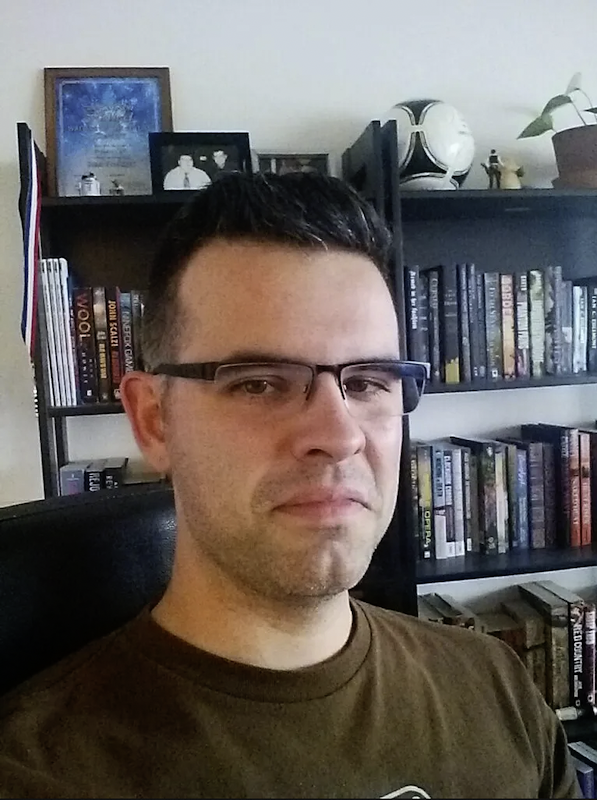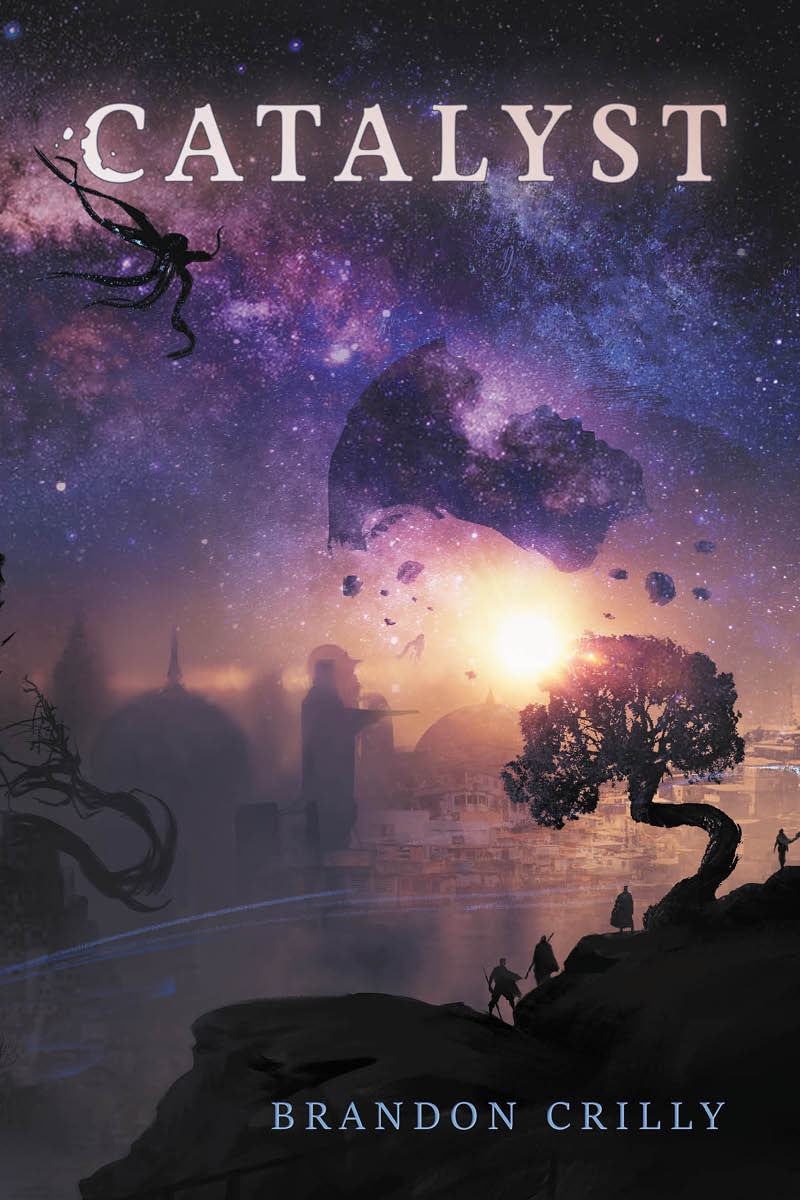Exclusive Interview with Brandon Crilly: Catalyst

Street magician Mavrin Leed doesn’t believe in what he can’t see or prove. His performances are mere tricks; the only true magic in Aelda comes from the benevolent, god-like Aspects circling it. As long as They keep the Lifesphere intact, he stays out of Their way.
Labeled a heretic, Eyasu Temergon is convinced that Aelda’s true history was hidden, even from the Aspects. He scours forgotten shadows for proof of the Raw, creatures of energy tied to the fracturing of his world. When their sudden emergence leads to destruction and chaos, Eyasu puts aside his estrangement with his old friend, and hopes Mavrin can do the same.
Ex-soldier Deyeri Renn has a mystery of her own: why are her city’s leaders so interested in the Raw? She spent too long fighting in the Winds to let a myth harm her city, and too many years alone to accept the life-worn man who bumbles back into her home, with no right to ask for her help.
As Deyeri, Mavrin, and Eyasu unpack the secrets that once drove them apart, every seal in their relationship means one more crack that could unravel Aelda’s very existence.

An Ottawa teacher by day, Brandon Crilly has been previously published by Daily Science Fiction, Apex Magazine, Fusion Fragment, PULP Literature, Flame Tree Publishing, and other markets. In 2021, he co-founded Bag of Giving, a monthly Twitch series where authors play TTRPGs for charity. He’s also an Aurora Award-nominated podcaster, conference organizer for Can*Con, a reviewer, and regularly has too many D&D campaign ideas than he could ever fit into his schedule. Find him online at brandoncrilly.com, on Twitter @B_Crilly, and on Instagram @brandoncrilly.author
Catalyst features an incredible cast of characters with complicated, overlapping histories. One of these characters is a stage magician who performs illusory tricks in a world where “real” magic is very present. What made you decide to bring these two contrasting approaches to magic central to this character’s identity?
Thank you for that compliment! Catalyst actually went through several serious revision drafts, and originally Mavrin (my street magician) was much more skeptical and almost willfully dismissive of "real" magic. When I added magic-bestowing squid gods (the Aspects) literally in orbit around Aelda, that level of skepticism didn't make as much sense - so instead, it became obstinance. Mavrin has a lot of issues with the Aspects and their worshippers, so becoming an illusionist is part of how he distances himself from both. "I can make my own magic, I don't need you!" is probably percolating in his subconscious somewhere (even though he’s fifty and not, like fifteen). But thankfully, he can only stay obstinate and grumpy for so long.
The cultural norms in Aelda, where Catalyst takes place, strongly center clear and consistent communication about gender – not just in terms of pronouns, but in terms of personal history and community. What do you hope readers take away from this reading experience with regard to how gender can be part of the communication practices of a culture?
One of my primary goals with Aelda was to present a world where gender fluidity was something commonplace, and things like sharing pronouns or expressing your identity is … unconscious isn’t the right word, but not a Thing because it’s been part of the world for a long time (maybe forever). And takes a variety of forms, whether it's flashing hand signals when you meet someone or wearing a sash that proudly displays your history as a trans person, in whatever way you choose. Avi Silver embeds gender expression amazingly in The Saoni Cycle and inspired my thinking about it, and my editor Emily and our sensitivity reader helped me fine-tune the specific worldbuilding. In terms of a takeaway, I hope it’s that gender expression can be present in a fantasy world in a way that feels natural – sort of where, as an ally, I want our world to get someday.
The story you’ve told in Catalyst deals with the aftermath of relationships ending quite badly. How does the idea of reconciliation impact your storytelling choices?
You’ve hit on a deep one there for me. I’ve written a lot of characters who need to mend their relationships in some way, partly because I had to do that work myself in my twenties (long story). Reconciliation is tough and messy, though. In Catalyst, you have characters who want to reconcile, but don’t know how to do it, so they’re going to make mistakes: overstepping, rushing an apology, avoiding talking about it altogether. Figuring out what circumstance would allow them to be vulnerable and stop putting up walls is critical for me, and sometimes that means setting up a situation I know will give the characters that space and letting them direct me sometimes when I’m drafting. (There’s one really emotional scene with Mavrin, Eyasu, and Deyeri that went in a totally different direction than I’d planned while I was typing. I’ll let you guess which one!)
This book has a lot to say about faith and the ways in which it is, for those inhabiting a world in which gods are quite present and observable, a matter of choosing or not choosing to participate in a relationship. Similarly, the characters who anchor Catalyst spend a lot of time choosing (or not choosing) to have relationships with each other. How does choice (and, per stage magic, the illusion of choice) factor into the way you build a novel?
Ooooh, the illusion of choice. Character choice is huge, and I really let the characters dictate where things will go. Or I outline by figuring out what external factors would need to happen to nudge a character in a certain way. Eyasu is a great example because he feels so strongly about the Aspects and his worship of Them that making him question his faith requires a lot – but there are a lot of little things that threaten to chip away at his resolve, and that’s deliberate (because apparently, I’m a monster). The same thing applies to his faith in Mavrin or Deyeri and how and when he chooses to reach out to them. But Eyasu can’t help but have faith in both of them, even when (spoiler) that faith is disappointed, so maybe that choice really is an illusion!
Catalyst takes place in a richly-built world featuring deep history that feels very present and immediate to the characters, even as knowledge of that precise history remains somewhat inaccessible. How do you approach layering history into your worldbuilding without losing the reality of knowledge erosion over time?
That’s a complicated one for me, partly because I’m a history teacher and lover of history. One of the things I try to carefully consider is who knows what about the past and why they know it. For example, something recent like the Incursions From Afar isn’t understood the same way by everyone in the book; Deyeri lived through it, but Eyasu and Mavrin were across the continent and only heard about it, so they don’t know the same things. A century later, whose recollections will survive? Go back three hundred years or so to when the Aspects first appeared, and a lot of the varied accounts will have been lost, and certain stories will have taken root and survived (particularly in a world that’s basically a theocracy). Which stories became dominant and why I think, is a critical question, along with which stories still survive despite being deliberately suppressed. And which stories have become myth? It’s tough to explore and reflect all of that in a narrative without losing the reader, and sometimes it means paring things down. Gods, I could go on - you’ve basically thrown a seminar topic at me, Gailey!
What do you love about the process of writing?
That moment when you hit a scene in draft one, and you know exactly what the characters are going to say and react without even planning it. Those words are the ones that usually survive untouched from first to final draft.
What do you love about sharing your writing with the world - about being a writer?
So much – this writing life is freaking hard sometimes, but there’s so much to love. Community, particularly these days. I adore talking craft or geeking out with my fellow writers. Playing a TTRPG with other writers is something else. I’ve made some amazing friends through this career and seeing their new work is energizing. But being a debut novelist and getting comments from people about specific things they enjoyed about the book is new and wonderful – and very, very surreal. Almost like real magic!
Add Catalyst to your tbr here. Pre-order it from your local independent bookseller, or order it via Bookshop.org to support independent booksellers throughout the US and the UK. For international shipping, you can try Barnes & Noble. And if you need to order from the Bad River Website, here’s a link that will leverage your order for good.
In the meantime, care for yourself and the people around you. Believe that the world can be better than it is now. Never give up.
—Gailey

Member discussion